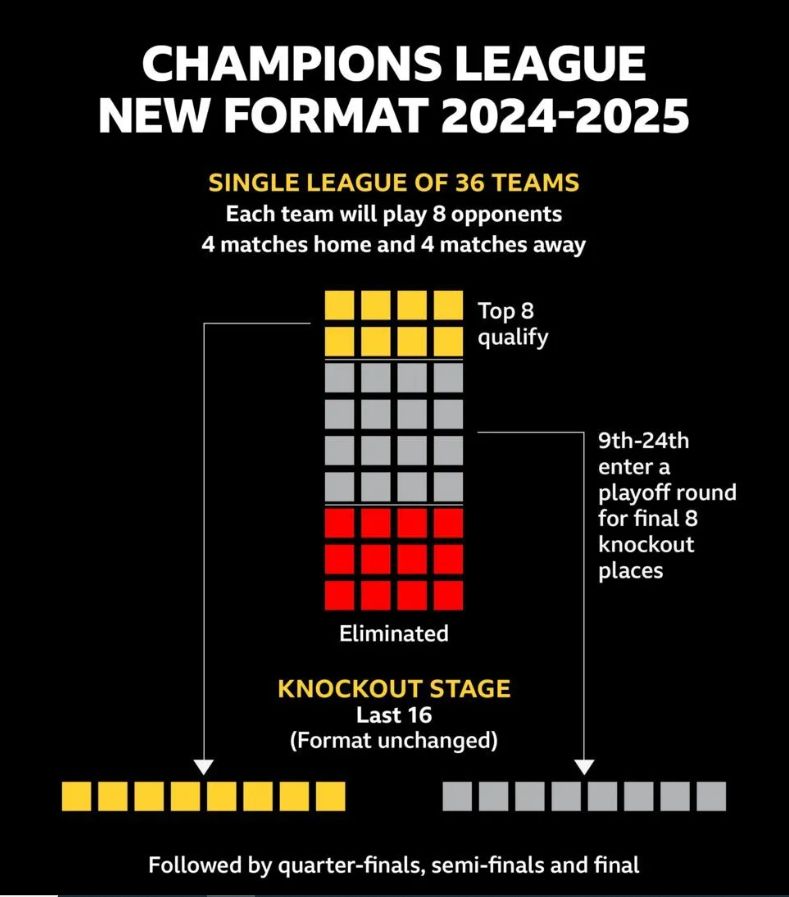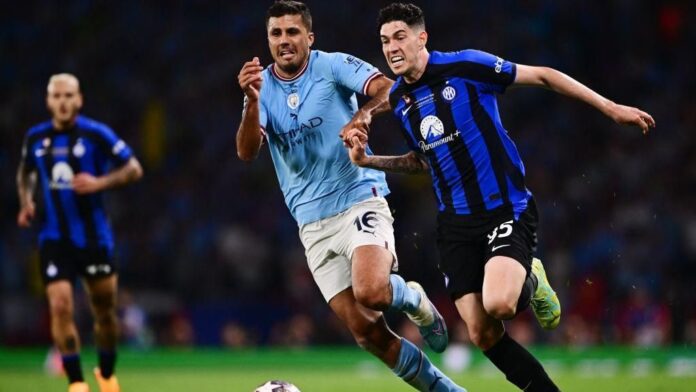Premier League Champions Manchester City will face Inter Milan on 18 September in their first match of this season’s Champions League – in a repeat of the 2023 final in Istanbul.
Liverpool travel to AC Milan – the Reds’ opponents in the 2005 and 2007 finals – on 17 September, while Arsenal kick off their campaign with a trip to Atalanta on 19 September.
Aston Villa, back in the competition for the first time since 1982-83, travel to Swiss side Young Boys on 17 September.
Scottish Premiership champions Celtic host Slovan Bratislava in their opener on 18 September before taking on beaten 2024 finalists Borussia Dortmund away from home on 1 October.
Arsenal host Paris St-Germain in the Gunners’ second game of the new ‘league phase’ that same day, with Villa taking on Bayern Munich at Villa Park on 2 October.
Arne Slot’s Liverpool welcome German champions Bayer Leverkusen and La Liga title-winners Real Madrid to Anfield on 5 and 27 November respectively, while the Gunners travel to Inter on 6 November.
City visit PSG on their penultimate league fixture on 22 January, with Villa hosting Scottish Premiership champions Celtic on Matchday 8.
All teams’ final league phase games will kick-off simultaneously, at 20:00 on Wednesday 29 January.
In a radical change from the previous Champions League format, each team plays eight fixtures in the new league phase of the competition.
The draw for the league phase took place in Monaco on Thursday, but the dates and times of the fixtures were only confirmed on Saturday.
Who will British teams play?
Aston Villa
- Young Boys (A -17 September, 17:45)
- Bayern Munich (H – 2 October, 20:00)
- Bologna (H – 22 October, 20:00)
- Club Brugge (A – 6 November, 17:45)
- Juventus (H – 27 November, 20:00)
- RB Leipzig (A – 10 December, 20:00)
- Monaco (A – 21 January, 17:45)
- Celtic (H – 29 January, 20:00)
Arsenal
- Atalanta (A – 19 September, 20:00)
- Paris St-Germain (H – 1 October, 20:00)
- Shakhtar Donetsk (H – 22 October, 20:00)
- Inter (A – 6 November, 20:00)
- Sporting (A – 26 November, 20:00)
- Monaco (H – 11 December, 20:00)
- Dinamo Zagreb (H – 22 January, 20:00)
- Girona (A – 29 January, 20:00)
Celtic
- Slovan Bratislava (H – 18 September, 20:00)
- Borussia Dortmund (A – 1 October, 20:00)
- Atalanta (A – 23 October, 17:45)
- RB Leipzig (H – 5 November, 20:00)
- Club Brugge (H – 27 November, 20:00)
- Dinamo Zagreb (A – 10 December, 17:45)
- Young Boys (H – 22 January, 20:00)
- Aston Villa (A – 29 January, 20:00)
Liverpool
- AC Milan (A – 17 September, 20:00)
- Bologna (H – 2 October, 20:00)
- RB Leipzig (A – 23 October, 20:00)
- Bayer Leverkusen (H – 5 November, 20:00)
- Real Madrid (H – 27 November, 20:00)
- Girona (A – 10 December, 17:45)
- Lille (H – 21 January, 20:00)
- PSV (A – 29 January, 20:00)
Manchester City
- Inter Milan (H – 18 September, 20:00)
- Slovan Bratislava (A – 1 October, 20:00)
- Sparta Prague (H – 23 October, 20:00)
- Sporting (A – 5 November, 20:00)
- Feyenoord (H – 26 November, 20:00)
- Juventus (A – 11 December, 20:00)
- Paris St-Germain (A – 22 January, 20:00)
- Club Brugge (H – 29 January, 20:00)
How does the new format work?
 Image caption: The new Champions League format
Image caption: The new Champions League format
The expanded 36-team tournament sees each team play eight games – four at home and four away – in the league system, against two opponents from each of the four seeding pots.
Teams who finish in the top eight will qualify automatically for the last 16, while those who place ninth to 24th will compete in a two-legged knockout play-off for the chance to join them.
Whoever finishes 25th or lower will be eliminated and will not be entered into the Europa League.
The number of matches in the new format will increase from 125 to 189.
Each team will play a minimum of eight games – instead of six – and a maximum of 17.
Champions League action begins on 17-19 September, and with the increased number of fixtures, the league phase runs until 29 January rather than finishing before Christmas.

